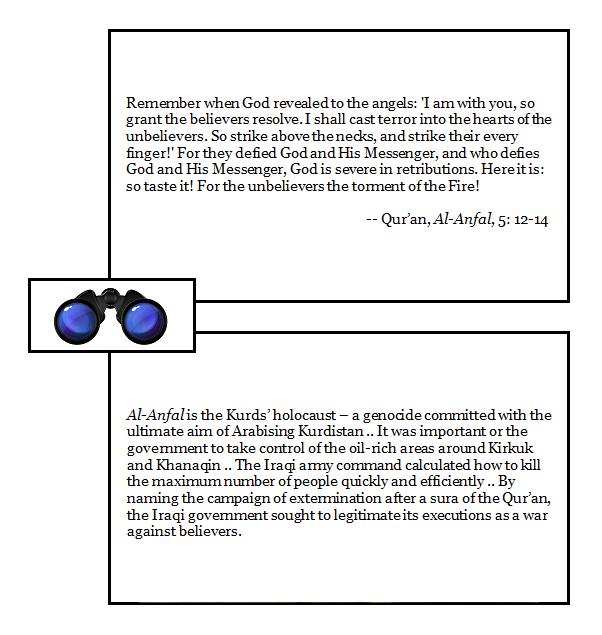[ by Charles Cameron — another example of what I call “landmines in the garden” ]
.
I wouldn’t have picked a bio of Anders Breivik as a likely source for insights into Iraq, but Åsne Seierstad‘s bio, One of Us, provides one all the same… first quoting the Qur’anic sura Al-Anfal (upper panel, below) in her epigraph to a chapter —
— then commenting on that quotation (lower panel, above) a page later.
**
What interests me here is Seierstad’s last sentence as quoted in the lower panel:
By naming the campaign of extermination after a sura of the Qur’an, the Iraqi government sought to legitimate its executions as a war against believers.
We have seen jihadists quote scripture often enough to suggest they have divine sanction for their acts of violence. Here it was Saddam Hussein in 1988 whose interpretation of the Qur’an provided that sanction. And I emphasize the word “interpretation” since Sura 8, Al-Anfal (The Spoils of War), was received shortly after the Battle of Badr, which it is understood to describe in detail, and its applicability by analogy to completely different circumstances such as Saddam’s campaign against the Kurds (and also, as Wikipedia notes, Assyrians, Shabaks, Iraqi Turkmens, Yazidis, Jews, and Mandeans) is indeed interpretive and subjective rather than “authoritative”.
Saddam Hussein’s “authority” in Quranic exegesis would be questionable at best — so long as one was not overheard questioning it in Iraq at the time.
Specifically, the very next verse of Al-Anfal clarifies the context. It does not say “When you find the unbelievers living in their villages and towns” — it says:
O believers, when you encounter the unbelievers marching to battle, turn not your backs to them.
But it is a little late for anyone to presume to give Saddam Hussein lessons in the book he once ordered written in his own blood, least of all myself.
**
My overall point here is that the world’s scriptures in general offer paths towards paradise, pardes, pardis – a tranquil garden or orchard. Not infrequently, though, they also contain texts which can blow up in our faces if read not in historical context but with contemporary violent intent.
Landmines in the Garden.
Caveat lector.



